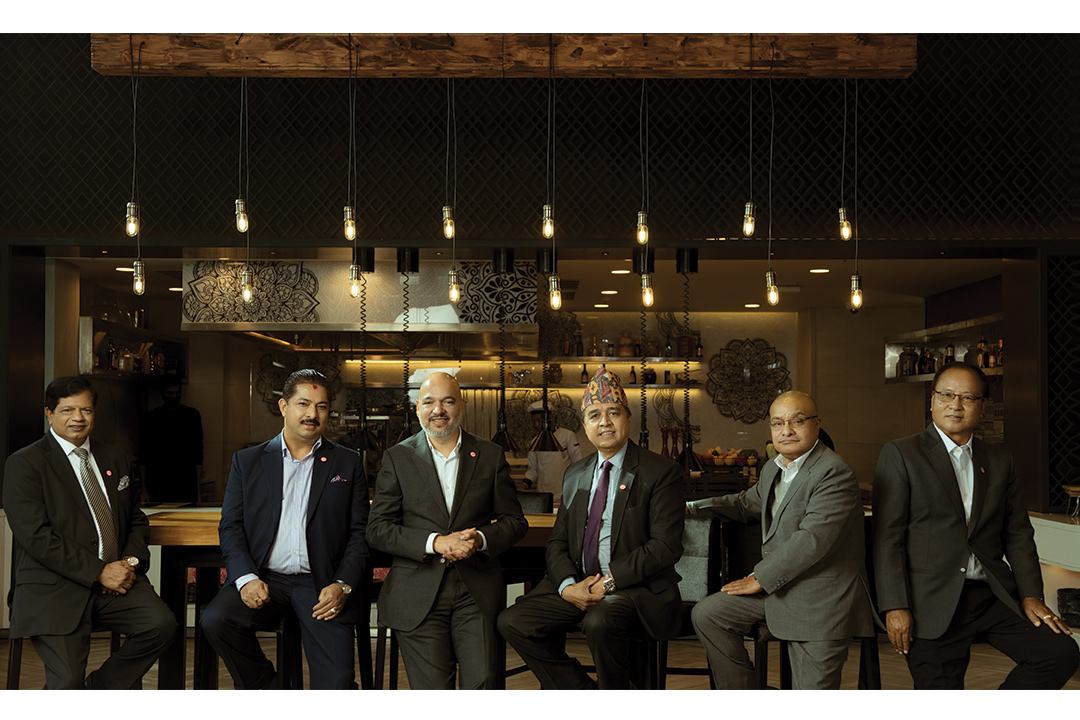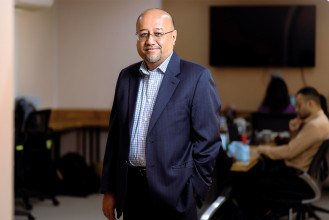
It has been a little over a year since the new executive committee of the Federation of Nepalese Chambers of Commerce and Industry was installed, led by Shekhar Golchha as the President and Chandra Prasad Dhakal as the Senior Vice President. Members of the current executive committee are Dinesh Shrestha, Ram Chandra Sanghai and Anjan Shrestha as Vice Presidents and Sukunta Lal Hirachan as Treasurer. One of the biggest achievements of this team has been the drafting of the National Economic Transformation 2030, a vision paper on where the current leadership of the FNCCI wants to see the economy of the country. The paper has set ambitious targets like increasing the size of the economy to $100 billion dollars, generating 2.2 million jobs in the organised sector and halving the trade deficit by the year 2030, all amidst a pandemic that is destabilising economies throughout the globe. Yet the new FNCCI leadership feels that if the country is able to persist with cooperation across sectors, the goals set out in the vision paper are largely achievable. In this edition of Business 360, we invited the executive committee of FNCCI to understand their leadership style and learn their thoughts on the threats and opportunities to the national economy. Here is what they had to say… SHEKHAR GOLCHHA President, FNCCI  How would you describe the FNCCI leadership at present?
How would you describe the FNCCI leadership at present?
The new leadership came in at a very challenging time. There were basically two big challenges that we identified: first is that we are still reeling under the pandemic, and the second being the perception of FNCCI as an organisation with a lot of infighting. The other challenge was people had started thinking we are not effective in lobbying with the government. So, we had our plans cut out and the first thing we did after the elections was to go for a retreat. We all decided that since we do not come from any political party or different thought processes or party alignments, it is important to give time and deliver in a much more coordinated way. We went for the retreat and came back as one team. We divided our responsibilities in that meeting and since then I have to agree that it has been a very harmonious FNCCI. It is not just the president who does the work. Everybody does, the committee members do it, and everyone at present is working together in a harmonious manner. The reason why I have spoken about harmony is that whatever we are doing at present has got a direction. As the biggest private sector umbrella body, we can't have members doing different things at the same time. Whatever we do is more aligned and focused now. After a lot of brain-storming, we came up with a vision paper called National Economic Transformation 2030 which basically outlines FNCCI's objectives, whereby we want to have a $100-billion-dollar economy by 2030, create 2.2 million jobs in the organised sector and halve the current trade deficit. We pointed out 100 initiatives that we need to take to achieve those targets and have identified 40 that we can immediately start during our tenure. We have communicated this to all our members and everybody has taken these as their main objectives. There is a lot more direction in whatever we speak in FNCCI and there is far more harmony and coordinated effort in whatever we do. This is something which we have achieved. We have also been very proactive in trying to bring back the economy, which has taken a major hit due to the Covid pandemic, to some form of normalcy. The best way to ease the problem was through the monetary policy because if liquidity is kept high then the interest rates go down and money is available more easily to restructure businesses. We held a meeting with Nepal Rastra Bank and we were able to achieve quite a lot and the interests went down. Hence, our economy was able to recover much faster than what many economists had anticipated. The FNCCI leadership now is also more focused on micro, small and medium enterprises (MSMEs) because we believe they are the backbone of the economy. During the pandemic, we lobbied with the central bank seeking subsidised loans for them and for the first time the refinancing facility was more focused towards MSMEs. The FNCCI at present is also emphasising the need to promote startups. In short, the FNCCI is a much more coordinated and collaborative organisation at present.
What do you think are the biggest opportunities and threats to the national economy at present?
The biggest opportunity I would say, is we have been able to come out of the Covid situation much faster than anticipated. This means our economic activities are going to and should continue in a smoother manner. The pandemic has affected us a lot and tourism, entertainment and MSMEs have yet to bounce back properly. However, the biggest challenge we are facing at the moment is the liquidity crisis which is unprecedented. This crisis, I believe, has been created probably because we recovered very fast. The other challenge we see is we do not have a stable government and a functional parliament at present and there are a number of laws related to the private sector which are still pending. We feel in order to attract investments, especially in the productive sector, we need to change a lot of laws. FNCCI has already prepared all the documents on what laws need to be changed and why we should change them but since there is no functional parliament, these laws are not given priority. Having the proper laws and policies is a must if we want to attract investments, be it domestic or foreign.
What do you feel about youth entrepreneurship and the startup culture in Nepal?
It is important not only for Nepal but for any other country to have a culture of entrepreneurship. I personally feel MSMEs and startups are the backbone of the economy. On any given day entrepreneurship is the most important thing and it needs to be harvested. What we need to understand is that the success rate of startups in Nepal is very low. I think all stakeholders need to concentrate on how we could get rid of this problem. When I talk about resolving this problem, I am not talking about businesses failing. Enterprises can fail but the spirit of entrepreneurship must not. A lot of young people are into MSMEs now and if you look at the organised and unorganised sectors in our country, they make up a major part of our economy. Many things have not been recorded but a lot of employment is created by the MSMEs. But the biggest challenge for them is access to finance for which the FNCCI is working with the banks and government. We have been working very closely with Nepal Bankers Association on how MSMEs could easily avail funds. The second challenge for them is access to market and for this we recently signed an agreement with Daraz. As per our agreement, MSMEs registered with FNCCI can list their products on Daraz on a zero-commission basis. Moreover, we will also be providing training on how to list the goods in every district of the country.
Any global trend you feel every business person should know of?
We are a very high-cost economy and reducing cost is a long-term perspective. It is not easy to reduce cost because logistics remain our major cost. Electricity, productivity of labour, land cost are all dampeners for production in the country. Of course, FNCCI is working very closely with the government on this issue but there are other areas where we can excel. I think the global IT trend is something we need to stress on. I think Nepali youths are very comfortable with computers and possess the knowledge so if given a good platform I think the country can excel in IT, which can help create a lot of jobs and also help export our services and attract a lot of opportunities. I personally feel we are a very resilient economy. And because of our youthful nature, a lot can be achieved in a very short time. We feel if the government truly believes that investment should come into the productive sector and wants to open up new areas then the government needs to create a conducive environment, especially regarding laws. It also needs to further develop the existing infrastructure.
What are the most promising business sectors of Nepal according to you?
Besides IT, I think there is a lot of scope in the services sector. Meanwhile, agriculture needs to be completely reformed. I think we need to not be looking for only staple foods but that which have higher value, which have export potential. It is not possible for us to be competitive in staple foods. But due to our biodiversity we have a lot of scope for high-value crops which we need to tap into. We can grow a lot of exotic things and with that money we can buy the staple foods. FNCCI is planning a huge agriculture seminar to see what should be done to improve the sector.
Any advice to the Finance Minister as the President of FNCCI?
It is great that the government most of the times meets its revenue targets but I would like to advise the Finance Minister that the government needs to demonstrate the same seriousness in spending that money. The government should plough back that money into the economy. Having said that, it is not the finance ministry that spends the budget but the various other ministries. The message I would like to give to all the ministries is that if spending does not happen then the whole economy is going to slow down to a point where inflation will rise and people will start losing jobs.
CHANDRA PRASAD DHAKAL Senior Vice President, FNCCI 
How would you describe the FNCCI leadership at present?
If you look at the leadership now, you will see that we are a pretty young team and we are representing all sectors of the economy. It has been just a year since we began our tenure but within this short period of time, we have tried to achieve the most we can. We created a vision paper for the national economy and we are also preparing a comprehensive database. The vision paper is a big achievement for us and we are working with the government to achieve the goals set in the paper. We did a lot of research and brainstorming before coming up with the vision paper. One of the things in the FNCCI leadership in the past was there used to some friction among the members of the executive committee; some used to be against some document while others used to be for it. However, the current members are working as one team. Yes, it is natural that during the FNCCI elections there will be some members supporting one candidate and other supporting a different candidate. But after the election was over and the executive committee was formed, there has been no such issue. From the day the election ended we have forgotten our differences and moved ahead as a team which I think is a very good thing for the federation. We are now as a team more focused on how we can coordinate and lobby with the concerned government authorities to help the private sector. And I believe the unity that the present FNCCI leadership has demonstrated has helped us to more effectively lobby with the government. If we are able to carry forward this unity then it will further help achieve our goals. Not only within FNCCI, we are also coordinating with other umbrella organisations of the private sector to unite and bring out a unified voice. This is something that you can see during this tenure, the coordination and partnership with other umbrella organisations too. One year is not a long time but this message that we have been able to convey within a year will stand in good stead for the entire private sector of the country.
What do you think are the biggest opportunities and threats to the national economy at present?
One of the biggest challenges we have been perennially facing is that the policies that the government frames are not stable. Every time there is a change in government, the policies also tend to change. What we should all realise is that to have a good business climate the policies need to be stable. Covid has been a great loss to the economy. The economy was on the mend gradually but now again there is a new variant of the virus, so we are a bit apprehensive if this could again affect the economy. But if we have a stable policy and if it comes out with rules to support the economy and develop domestic production, then there are so many opportunities here. There is no lack of opportunity in Nepal. It is just a question of how we are able to frame the required policies to harness the resources that we have.
What are the most promising business sectors of Nepal according to you?
If we talk about Nepal and if I have to give it on a point basis, then tourism is one of the sectors with a lot of opportunities. Whether you talk about the temples or the religious sites like Pashupati and Lumbini, there is so much here. The first thing I would say is that we must explore the tourism sector because we already have the things that are required for tourism, we just need to manage them and market them properly. Then it has to be the hydropower potential that we possess; we need to further capitalise on this asset. Also we need to capitalise on mining. In case of manufacturing, we are in between India and China, so if we can boost our production these two countries can become huge markets for us. I think there is a possibility for all business activities in Nepal, it is just about developing the willpower and working towards achieving our potential.
What do you feel about youth entrepreneurship and the startup culture in Nepal?
Previously, only people who had the money or those who had property to keep as collateral and avail loans from banks could and would start a business. But that was a concept back then. Now if you have a viable project, if there is innovation, then finance will not be difficult for you. There are so many financial institutions in the country that provide the necessary funds. Even individual investors are giving priority to innovation in Nepal these days. That culture of youth entrepreneurship and startups has started to gradually grow in our country. Even within FNCCI, we have plans to select 50 startups and match them with investors. That basically is just a start and I believe in the future this startup culture will flourish in our country. We have been talking with the commerce ministry and finance ministry so that we can further help youth entrepreneurs. We are lobbying for a good policy. I strongly feel in the coming days youth entrepreneurship will gain more momentum in Nepal.
Any global trend you feel every business person should know of?
At present, we are all talking about digitising everything that we do whether it be education or business. This is one global trend that we had already been adopting and I think the Covid pandemic just hastened the process. We have started conducting so many transactions through our mobile phones, now we can further develop that. There is a possibility of staying in Nepal and working for the global market and we need to tap that potential. Like how India has grown by leaps and bounds in the IT sector, we can do it our country too. Right now, I see there is an opportunity in every area.
Your vision for the national economy… There is a possibility and opportunity in every sector. As the Senior VP of FNCCI and as an entrepreneur, I think we should try to create employment for as many people as possible. We should also prioritise domestic production and substitute imports. And in places where there is no infrastructure we need to develop it so that people in those places can also become economically active. Personally, we are planning to build tourist attractions like Chandragiri in all seven provinces. We will soon be starting work in Butwal and Gaindakot. Similarly, we are also starting in Sikles. We are trying to promote domestic tourism and at the same time also attract international travellers. The main thing is when people have gone abroad and acquired some skills, we need to be able to retain them in the country so that they can contribute to our economy. We need to capitalise on that. DINESH SHRESTHA Vice President - District, Municipal  How would you describe the FNCCI leadership at present?
How would you describe the FNCCI leadership at present?
One of the main aspects of the FNCCI leadership at present is that we are working as a team for the benefit of the entire private sector. However, due to the Covid pandemic we have not been able to work as planned since the beginning. What can be noticed now within the federation is that all the committees have become very active. Unless we are united as a team, we will not be able to achieve the things we set out to do and that is a crucial factor – being on the same wavelength. The members have elected us and we need to fulfil their aspirations. The FNCCI was basically established to lobby with the government on agendas that are important for the private sector to develop but when there are fragmented voices being raised then your voice gets drowned out. I think the current leadership is aware of this and has been uniting all members to stand on the same platform so that our lobbying is more effective. It is necessary that the executive committee members speak in one voice and that is what the current FNCCI leadership is all about. Moreover, we have not just focused on seeking facilities but are also advising the government on how the tax system can be streamlined and made more effective and business-friendly so that the state can earn proper revenue. Whether it be the annual budget or the monetary policy, the FNCCI leadership has provided suggestions to the government and some have been included which is an achievement for us. However, what the current FNCCI leadership has done is that any issue that we take up with the state is not for the benefit of just an individual or a certain group, it is for the greater good of the country's business community. The present leadership's mission is to help domestic industries become more competitive in the international market and we are urging the government to frame policies accordingly.
What do you think are the biggest opportunities and threats to the national economy at present?
The biggest threat to us are India and China simply because of the size of their economies. However, if our politicians and stakeholders realise the importance and maintain cordial relations with them, then they can become big opportunities. We need to be more diplomatic and try to urge both the nations to allow goods manufactured in third countries to be exported to their markets from Nepal and if this could happen then it won't take long for us to economically develop like Singapore. We are a small country so if we demonstrate the will we can develop quite quickly. The problem right now is around 2% of India's exports are to Nepal, which is a huge amount and that is why the trade deficit is ballooning. And at present, trade with China is like one-way traffic – we are importing their goods but they aren't citing dangers associated with Covid. Previously, we had to worry only about the southern neighbour but now even China has become a major trade threat. I see a lot of potential in hydropower and infrastructure. If we can develop our infrastructure, it will create more opportunities. The government is building roads and trying to expand telecommunication services and though not as expected, it is a laudable move. The other aspect which could help us is if the government digitalises all its services. There is one area I would like to talk about is the taxation system, which I feel does not encourage people to take risks and start businesses. If a person deposits money in the bank, then you get like 10% interest and the tax on it is 5%. If one builds and rents out their house, then the tax on it is 10%. However, when you open a business, which is about taking a lot of risks, then one has to pay 35% tax. So, in a way we are promoting the culture of lying back and earning more than taking risks to start an enterprise.
What do you feel about youth entrepreneurship and startup culture in Nepal?
The startup culture is gradually gaining traction here but most of the time it is limited to discussions. Even when you look at smaller nations like Singapore and Taiwan, which have developed tremendously they have invested a lot in developing entrepreneurship. The government collects taxes from us but the question is where does it put in all that money; this is very important. For startups to succeed there has to be good investment. The government needs to promote and facilitate them. The nations I just mentioned invest in the startups with the knowledge that all will not succeed but even if one does, it will help recoup the investment. It is very important that the youngsters who are starting businesses be given the opportunity to foster. They should not feel there is no opportunity in the country and go abroad. At present, it is mostly the unskilled who are migrating for work but if we make things difficult for them it won't be long before the educated youths too start migrating in droves.
What are the most promising business sectors of Nepal according to you?
There are a couple of sectors which have promise and we have been advising the government regarding them. We had earlier apprised the government about the potential of cement and now it has gathered pace. Yes, we are small and do not have raw materials but even Japan does not have much, yet it is a manufacturing hub. It is all about having proper discussions and identifying which industries we want to promote and working accordingly. The hydropower sector is another example of how things can happen if the right policies are introduced. Tourism, education and health, I believe, have good scope. Everybody talks about agriculture but we have to realise that our government cannot provide the type of facilities given by India and China to their farmers so it will be difficult to be competitive unless we focus on a few high-value niche crops. Education has tremendous potential. If you compare the cost of studying medicine or engineering in developed countries to that in Nepal, it is really cheap here. We need to promote this sector. If we could open world-class schools in the Tarai and proper promotion is done, we could attract Indian students. The other advantage we have is our climate which we could market for medical tourism. I would again emphasise let's have thorough discussions and identify such core sectors and work in collaboration.
Any global trend you feel every business person should know of?
Across the globe there are new ideas being generated and new technologies being developed for the economic benefit of the country. We need to closely watch these developments because today we are talking about hydropower but what if tomorrow there is a better and cheaper source of energy. So, the global trend at present is all about generating new ideas and we should encourage people here to think of new ideas. The other aspect I would like to dwell on is that countries become rich by selling the resources that are available there. So, we also need to utilise our resources. ANJAN SHRESTHA Vice President - Commodity  How would you describe the FNCCI leadership at present?
How would you describe the FNCCI leadership at present?
It is not proper to compare the present leadership with those in the past but what I can talk about is what we have done. We have done a lot of homework to prepare the Vision Paper 2030. We have various forums and committees in the federation and we have made them very active these days. We are working towards fulfilling the objectives of the vision paper and what the new leadership has done is made all the members active and interactive. I think that is the biggest achievement of the current leadership at FNCCI, getting more members involved.
What do you think are the biggest opportunities and threats to the national economy at present?
The biggest threat to the economy as far as I have seen is the inconsistency in policies introduced by the government. The country is not moving ahead as per good governance principles. If you look at the policies in recent times, you get the feeling that they have been introduced to favour a set of people or a group. We are moving towards a culture of favouritism. I also feel that the policies do not have long-term vision and are brought for short-term benefit of a certain group. Those running the government are into favouritism and this is a big challenge now. There is no predictability in the rules and regulations that are introduced. The other thing is we will soon be graduating to a developing country from the status of a Least Developed Country and we keep talking about achieving the Sustainable Development Goals (SDGs), but every year we have a problem with funding. We lack the funds that are necessary for the economic and social development of the country. How can we achieve the SDGs by 2030 and what is the way forward once we have graduated? That is a question that needs to deeply studied. It is not about just wanting to be a developing country. We need to have the required funds too. So there has to be management of funds. Right now, we consistently hear about increasing government revenue but what everybody needs to realise is how are you going to increase revenue when the economy is not growing. The GDP needs to grow first and for that there has to be enough investment in the country. We don't have the capacity to spend capital budget. Even this year it is stuck at around 4%-5%. Even after the budget has been revised and the capital expenditure reduced it is still so low. So how are we going to achieve all those goals? The other thing is we now have enough electricity production but lack transmission lines to distribute that. We never planned for that. Everyone seems to be doing things in an ad-hoc manner – both, those running the government and the bureaucracy. This is very clear. Right now, we have surplus energy but the sad thing is neither do we have the capacity to domestically consume it or export it? We always talk about prosperous Nepal but a country can never be prosperous when things are done based on ad hoc manner. The other challenging aspect is it is very difficult to access land to do business or set up industries. If we talk about the opportunities here, then there are tremendous possibilities. From tourism to agriculture to manufacturing to mines. Look at the cement industry in the country. It has become so huge. If there is a will to do something by the government then the private sector will help achieve that. We have a scope in minerals and precious stones too. It is about how we can leverage them. Take hydro for instance. Right now, there is a policy of the Indian government that if a hydro project is developed through foreign investment, then the energy generated cannot be exported to India. Such types of issues need to be resolved through diplomatic channels. It should be done through G2G talks and our government needs to convince the Indian government. Where is the political diplomacy? Even during my lifetime, the country has been through so many political changes and today we are a federal republic. However, the thought process of the leaders and the people do not seem to have changed much. It is time and very necessary that we change the way we think and look at things.
What do you feel about youth entrepreneurship and the startup culture in Nepal?
Previously most of the youths were into seeking jobs but now that has changed for the better and most want to become job providers. This change from job-seekers to job-providers is a very positive development. We can see so many young people starting businesses even if it is on a small scale. New ideas are being generated. Now to support those youths who want to start something on their own, there has to be proper laws and policies that help them move forward. The government has to ease the process of setting up businesses for them and provide support. It has announced through the budget that it has set up a fund for startups but the sad part is that implementation of the policies related to it is slow. Making announcements will not suffice, it has to be implemented promptly. If things are delayed, then we will not be able to achieve much.
Your vision for the national economy… We have been facing problems since the last two years due to the coronavirus pandemic but I see a lot of potential in the economy. Once the pandemic is over, we can move ahead fast. What I would like to say is that the government should not be involved in business whether it is manufacturing or trading. Its job is to monitor and facilitate and regulate if something goes wrong. It has to act like a guardian to foster the economy. That has been lacking. I have noticed among politicians and the bureaucracy that some of them feel the government should be involved in business. We have adopted a free-market economy and it is enshrined in the constitution. What his means is that the government should not be doing business. It has to see how it can develop the private sector and make sure funds are adequately available for investment. What we all also have to realise is that no matter what plan we make be it a five-year or a 10-year goal, the first thing you need is finances and for that the economy has to grow. FNCCI, as the largest private sector umbrella body, has been lobbying with the government and doing all that is necessary to secure investment. We will further work on that.
What are the most promising business sectors of Nepal according to you?
What I have seen is that tourism is the sector with the biggest potential in Nepal. The next is hydropower. Agriculture also has the potential but the problem in recent times is that land is being fragmented and when this happens it is difficult to have large scale commercial farming. There have been talks about contract farming but we have not been able to move ahead accordingly. Land use policy needs to be clearly defined and implemented effectively. For tourism to further grow the government needs to work on developing the destinations and build the required infrastructure. The remaining investment will be done by the private sector. I believe we can be prosperous through hydroelectricity. Now to develop projects with huge capacity we need foreign investments so there has to be economic diplomacy and Nepal needs to convince India to buy the power generated through such projects because India is a vast market and the energy they require is ever-growing.
Any global trend you feel every business person should know of?
The one trend that we should all focus on and many have already started doing is to go digital. Even in Nepal people have started adopting digital means in so many areas. We should be in that digital loop and not carry on in traditional ways. Now the world is talking about artificial intelligence and other new technologies so we should be able to introduce those concepts here too. I think in recent times more than manufacturing, the tech business is surging way ahead, so we have to adopt that. It's nice to see our youths are more technology friendly. RAM CHANDRA SANGHAI Vice President – Associate  How would you describe the FNCCI leadership at present?
How would you describe the FNCCI leadership at present?
I can't talk much about the previous leaderships of FNCCI but the current leadership is a united one and the President we have at present I must say is a very amicable person who can get the team going in a united manner. What I feel is that we are business persons involved in various sectors and we are working to resolve the problems that keep arising, and we understand that we need a united voice to resolve issues. Once in a leadership position, it is also our duty to understand the problems being faced by various businesses and try to resolve them. For that I think we have a perfect team now at FNCCI.
What do you think are the biggest opportunities and threats to the national economy at present?
Whenever I think of threat to our national economy, the only thing that crops up in my mind is the need for a stable government. I always lay emphasis on that and give it a lot of importance because when we have a stable government then only can we actually give time to thinking on how we can develop the country, be it economically or socially. Whenever there is an unstable government then there will always be fighting among the political parties on who is going to form the next government and the economy is pushed to the backburner. The government will not be able to focus and move on the path of development because everyone is preoccupied with forming the next government. We have been trying to convey this message through various platforms but that thought has still not developed among the political leaders. The opportunity I see is that our country has all the prerequisites for tourism. We can do a lot of things in tourism in a big way. Just recently I was in Switzerland and when I saw the development there, the first thought was why can't Nepal be like that. Why haven't we been able to develop? Like the Swiss, we also have mountains and rivers and nature has given us so much but we haven't been able to do much. Even if we have the tourism potential what we need to realise is that the infrastructure needs to be proper. Our roads are so bad and most roads after six months of being built start getting littered with potholes. I travelled a couple of thousands of kilometres by road in Switzerland but not once did I encounter any pothole and there was no garbage. Even the rivers were so clean. We can do all that in Nepal and if we are able to, I see a lot of potential in tourism. We also have a lot of potential in hydroelectricity. The government has taken a lead role to develop hydroelectricity but now again I have seen that it is holding back in signing PPAs. The reason it is citing is because there is less consumption. When we talk to the government it says when there is not much consumption then what is the point in producing more but it should have thought about having the necessary infrastructure beforehand. We need to analyse where we went wrong. If we can develop this further then it will boost our economy.
How do you view our policies?
If the government takes businesses into confidence and develops laws and policies in collaboration with the private sector then definitely, we will have proper policies. But what happens is that the government makes policies and introduces them and there are always drawbacks in many. And then we have to again hold talks with the state for the required changes. Whenever the government introduces any policy, it should know how it is going to affect the businesses both in the short and long term. They have to study the long-term effect of the policy. Just recently, there was a policy of not allowing the import of plastic but we must realise that the moment it is implemented all the industries based on that commodity will have to shut down. Again, business persons had to hold talks and get it amended. The moment industries close down, the government should realise that hundreds will lose employment and the state will also lose out on tax revenue. Rules should be introduced after proper study and there should be a timeline so that everybody can gradually adopt and adapt to the changes. Now there are some products where we have to use plastic so if you ban it totally then what are those industries going to do? There should be an alternate before such decisions are taken. When policies are framed for the benefit of just a few then it will hurt the larger industry. What do you feel about youth entrepreneurship and the startup culture in Nepal? I have always said that the youths should be given the opportunity to start their own businesses or to get decent jobs. FNCCI is taking the initiative to help small businesses and startups. We have conducted numerous meetings for that. Even the government has taken an initiative for that. I am not very optimistic about the government initiative but I hope something good comes out of it.
Your vision for the national economy… I personally feel that the word 'economy' should be a part of the vocabulary of every politician and bureaucrat. It has to be an urge from within that the economy should always get priority. The business community is ready for economic growth, now we need to have the government speak on similar lines. When any business person starts a business, they will want to grow it. It's like raising a plant; how to plant it, water it, fertilise it and harvest it. Even if I don't have the knowledge initially, I will study about it before I start any business. That will be within me. Even when I am praying, I will have that business in mind. So, the government people need to have a similar feeling. They should not think about only their vested issues but about the economic growth of the country. If that happens then there will be more employment. FNCCI has taken out a vision paper so we are working towards it but at the end of the day, all stakeholders need to be on the same platform. The government needs to be serious and without developing the productive sector, I don't think we can have good economic growth. Look at any country's history, economic growth is about boosting productive industries. Even Bangladesh focused on garments with backward linkages and today it is the second largest exporter of garments. Twenty years back we were ahead of Bangladesh in garments.
What are the most promising business sectors of Nepal according to you?
For economic growth, I think there are four sectors which could help us. The first would be tourism. The other is hydroelectricity. The next is agriculture because the land in Nepal is very fertile so we can tap into that. Not only fertility, the soil here is so good that the crops produced here are tastier. For instance, if you consume rice that is grown in Nepal and that which is grown in some other country, you will be able to find the difference. The fourth area that the country needs to focus on is the productive sector. The government should always treat any industry like it is their child. It has to raise that industry the way it would a child. The government should be aware that if any industry collapses, the ramifications are great. If it acknowledges the importance of that then we can have tremendous economic growth.
Any global trend you feel every business person should know of?
I think in our country we haven't still developed the concept like in other economically strong nations that when I set up an industry here then I should be thinking about the global market too and not only the domestic market. We should think of expanding to other countries too but the problem is we cannot send money abroad for such purposes and we have been lagging behind. The government should hold discussions and introduce a policy whereby we can invest in foreign lands and if we are allowed then we will be able to compete. This is one global trend I would like to see in our country. SUKUNTA LAL HIRACHAN Treasurer  How would you describe the FNCCI leadership at present?
How would you describe the FNCCI leadership at present?
The executive committee that we have under the leadership of our current President has a lot more unity now. Not only that, there is much more coordination between the other private sector umbrella organisations like the Confederation of Nepalese Industries and Nepal Chamber of Commerce with FNCCI. You must have noticed we have taken out joint statements on a number of occasions. The current FNCCI leadership has been able to unite all business persons to raise a similar voice. The second thing is we have taken out a Vision Paper 2030 on what the government was and is supposed to do. We have taken the responsibility to work on this. The vision paper will also help our policy makers a lot. There are many parts to the vision paper and it has already been endorsed by the FNCCI's annual general meeting. We are trying to increase GDP and employment by 2030 and also reduce trade deficit. Such a plan was lacking previously.
What do you think are the biggest opportunities and threats to the national economy at present?
The greatest threat in the country is most of the laws are not business or investor friendly. Many of the laws have been introduced just to regulate businesses. Even if it was just regulatory it wouldn't have been a problem, the issue is it does not allow you to grow as expected. Like for instance, I have invested in hydropower too but it is mind boggling when you look at the number of ministries and departments you have to visit before you can actually start. One needs to visit so many ministries and each place has so many hurdles that it becomes a tiresome effort. It is very difficult to start any new venture due to so much of red tape. There has to be a simplified mechanism for anybody to start any business. You can try starting any business and you will realise what I am trying to say. The rules are made in such a way that it is like 'if I cannot strangle you with one law then there is another law for that'. It is only about restricting growth. In this way it will be difficult to move ahead. Now there are countries which will lay out a red carpet if you want to invest and there are some now who are willing to compensate you if you do face losses. But in Nepal starting a business itself is a Herculean task. The government talks about one-window and single-door policy to attract investments but when you actually start, it is like going through a maze. We are scaring away the investors even before they have actually come. The first thing we need is be investment friendly and have rules accordingly. There are some friendly laws but again there is always another law that contradicts it. Some laws are overlapping or contradicting. And the sad thing is the ones implementing the laws all seem to have a negative mindset; they never speak anything positive. There are tremendous opportunities here in agriculture. Nature has given us so much; within a span of like 500 to 600 kilometres we have the highest mountains and also the tarai. The only thing we need to do is utilise them properly. I would like to mention that awareness among people has risen but most are focusing only on the negatives. For instance, if you want to set up a hydro plant then the people there think as though money will fall from the sky and the amount they seek in compensation is mindboggling. Even the health sector has so much potential. We could have medical tourism. That has a tremendous potential because Nepal is an all-weather country. We have fantastic weather here to develop medical tourism. We are also very service oriented. And some say we Nepalis are lazy, it is not so. You go abroad and you will see Nepalis doing amazing work. It is just that here maybe we don't have the opportunity.
What do you feel about youth entrepreneurship and the startup culture in Nepal?
I think the culture of startups and youths getting into business is really good and we have to give them the opportunity. The main problem is there are so many youths registering new businesses but only 5% may be able to access the required resources. This is one area where we need to work on and FNCCI too has taken the initiative to not only help startups but micro, small and medium enterprises (MSMEs) too. The government is also trying to give this concept a boost. The only problem in our country is regarding the implementation. There is a budget announcement and a lot of clapping. But after that it just dies out. We haven't developed a culture to follow through on achieving the things we plan or announce. The problem is we do not value time. We take ages to implement the decisions we take. The one thing youths need to be careful of is not following the crowd. Do not start something that others are doing because they are making profits. That is one reason why some sectors become overcrowded and all fail.
Your vision for the national economy… The first thing is we have to increase the size of our economy. The next is to reduce the trade deficit and then focus on generating more employment opportunities. For this the government has to create a proper environment. Businesses are run by the private sector and it should remain like that. The government needs to just put the proper policies in place and facilitate businesses. It has to trust the private sector because you can see any country that progresses, it is due to the private sector progressing. And just framing policies is not enough, they have to be properly implemented too. The other area I would like to speak about is the mechanism for judging cases also needs to be improved. If you look at the trend here, then when you go to the labour ministry with any issue, it is usually the employer who loses the case. There is bias, all facts and figures need to be taken into consideration without any prejudice. I am not saying that if the employer is wrong you have to support them. Justice needs to unbiased. We also need to prioritise domestic production. It would be nice if people gave preference to domestic goods.
Any global trend you feel every business person should know of?
I think the one global trend that every Nepali business needs to be aware of is the rapid development that is taking place in information technology. This is the age of virtual reality and artificial intelligence. People across the globe are adopting digital modes in literally every sector. So, we should stay in tune with these technological advancements and implement them in Nepal. It is not that we have not been doing so, all I am saying is that technology or the access to it should not be limited to the urban centres. Every citizen should be able to reap the benefits of technology.




-1767340083.jpg)
